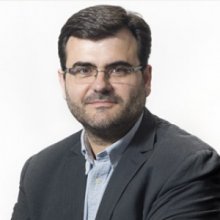Images
Participants









Contact

According to the World Health Organization (WHO), "Cancer" is a broad term used to refer to a set of diseases that can originate in almost any organ or tissue in the body when abnormal cells grow uncontrollably, exceeding their usual limits, and sometimes, they invade other organs and tissues. This last process is called "metastasis", and constitutes 90% of deaths from cancer. Other common terms for cancer are "neoplasia" and "malignant tumor".
According to a recent report prepared by the Spanish Society of Medical Oncology (SEOM) and the Spanish Network of Cancer Registries (REDECAN), the number of cancers diagnosed in Spain in 2025 will reach 296,103 cases, which represents a slight increase in 3.3% compared to 2024. Just as an increase in the incidence of cancer is expected worldwide, in Spain it is estimated that in 2050 the incidence will exceed 350,000 cases.
On World Cancer Day, IRB Barcelona reaffirms its commitment to cancer research. Our multidisciplinary teams, composed of internationally renowned researchers, develop pioneering projects that span from basic tumor biology research to the creation of innovative, personalized therapies.
In this article, we want to present the work carried out in our Institute on some of the main types of cancer, as well as the teams that make it possible.
Colorectal Cancer
Colorectal cancer is the third most common type of cancer worldwide, with approximately 1.9 million new cases per year. Our Colorectal Cancer laboratory, led by Dr. Eduard Batlle, ICREA researcher at IRB Barcelona, conducts pioneering research in colorectal cancer.
One of his most notable contributions is the identification of "High Relapse Cells", a subpopulation of tumor cells responsible for relapses after treatment. This discovery, published in Nature (2022), has paved the way to the development of targeted therapies that block the metastatic capacity of these cells.
Breast Cancer
Breast cancer is the most diagnosed tumor in the world since 2021, surpassing lung cancer, with an incidence of 132 cases per 100,000 inhabitants, mainly affecting women between 45 and 65 years old.
The laboratory led by Dr. Roger Gomis, also an ICREA researcher, focuses on the mechanisms that drive breast cancer metastasis. In a study published in the journal Nature Cell Biology (2023), his team identified the role of the MAF oncogene and the KDM1A enzyme in promoting bone metastases, opening the door to new therapeutic opportunities through the inhibition of these molecular targets.
Dr. Ángel R. Nebreda's laboratory also investigates the mechanisms of resistance to treatments, as well as new targets to enhance the effect of existing drugs in triple negative breast cancer.
Lung Cancer
Lung Cancer is the leading cause of cancer-related deaths worldwide, with a survival rate of between 5 and 25%.
Dr. Núria López-Bigas, ICREA researcher and professor at Pompeu Fabra University (UPF), leads the Biomedical Genomics group, which uses advanced computational tools to study the biological foundations of cancer, including lung. His research published in Nature Genetics (2023) has identified new molecular subtypes of non-tobacco-associated lung cancer, including driver mutations and possible therapeutic targets.
On the other hand, Dr. Fran Supek, who leads the Genome Data Science laboratory, is part of the European project LUCIA, which aims to study lung cancer. His laboratory contributes by analyzing the genomics and epigenomics of samples after exposure to different risk factors and how these contribute to the development of the disease.
Endometrial and Ovarian Cancer
Endometrial cancer is the sixth most common cancer in women worldwide and its incidence has been increasing in Europe, especially in countries with greater obesity rates, since it is a known risk factor. On the other hand, ovarian cancer, although less common, is the main cause of mortality from gynecological cancer, since it is often diagnosed in advanced stages, which makes its treatment difficult and worsens the prognosis.
The team of Dr. María J. Macías, ICREA researcher at IRB Barcelona, focuses on identifying biomarkers that predict the recurrence of endometrial cancer. Recent work by Dr. Macías' team presented a predictive genetic panel that facilitates the classification of patients and the personalization of their treatments.
Dr. Fran Supek's team (Genome Data Science) is part of the DECIDER project, focused on improving the diagnosis and treatment of ovarian cancer.
Prostate Cancer
Prostate cancer is the second most common type of cancer in men worldwide, after lung cancer. In 2022, approximately 1.5 million new cases of prostate cancer will be recorded, representing 7.3% of all cancer diagnoses in men.
In a study published in Nature Structural & Molecular Biology, the laboratory run by Dr. Xavier Salvatella discovered an innovative approach to inhibit the androgen receptor, which plays a key role in the development of prostate cancer. This discovery was the basis for the creation of Nuage Therapeutics, a spin-off of IRB Barcelona dedicated to the development of drugs targeting proteins with disordered regions.
Pancreatic Cancer
Dr. Direna Alonso-Curbelo, head of the Inflammation, Tissue Plasticity and Cancer laboratory at IRB Barcelona, specializes in pancreatic cancer. Additionally, she leads the IGNITE (Unmasking Non-Genetic Determinants Instructing Tumor Initiation) project, which investigates the fundamental bases of how different inflammatory processes drive (or slow down) the initiation and the cancer progression, taking pancreatic cancer as the basis of her studies.
Pediatric Cancer
Worldwide, it is estimated that each year around 400,000 children and adolescents between 0 and 19 years old are diagnosed with cancer, with leukemias, brain tumors and lymphomas being the most common types.
Recently, IRB Barcelona has opened a laboratory dedicated to the epigenetics of pediatric cancer. The objective of this group, led by Dr. Alexandra Avgustinova, is to identify tumor-specific developmental vulnerabilities and exploit them in the search for personalized therapies to improve patient prognosis.
As a rare cancer, the probability of a child developing two independent cancers in childhood is extremely low. However, these cases do occur and studying the origin of these second neoplasms not only serves to explain these specific cases but also contributes to a better understanding of the origin of pediatric cancer in general.
In this context, Dr. López-Bigas, in collaboration with Dr. Augustinova's laboratory, led a study that investigated the cases of four children who had suffered two cancers during childhood and clarified the origin of the second tumor.
In addition to the laboratories and projects that are dedicated to researching different types of cancer, IRB Barcelona groups are involved in studying the biological mechanisms of cancer, treatment responses, and resistance to therapies.
IRB Barcelona continues to be at the forefront of oncological research, integrating molecular biology, bioinformatics and therapeutic innovation.
Advances from our laboratories expand scientific knowledge and pave the way for more effective and personalized treatments. Thus, we reaffirm our commitment to the global fight against cancer, tirelessly working to improve patients' lives.
About IRB Barcelona
The Institute for Research in Biomedicine (IRB Barcelona) pursues a society free of disease. To this end, it conducts multidisciplinary research of excellence to cure cancer and other diseases linked to ageing. It establishes technology transfer agreements with the pharmaceutical industry and major hospitals to bring research results closer to society, and organises a range of science outreach activities to engage the public in an open dialogue. IRB Barcelona is an international centre that hosts 400 researchers and more than 30 nationalities. Recognised as a Severo Ochoa Centre of Excellence since 2011, IRB Barcelona is a CERCA centre and member of the Barcelona Institute of Science and Technology (BIST).




